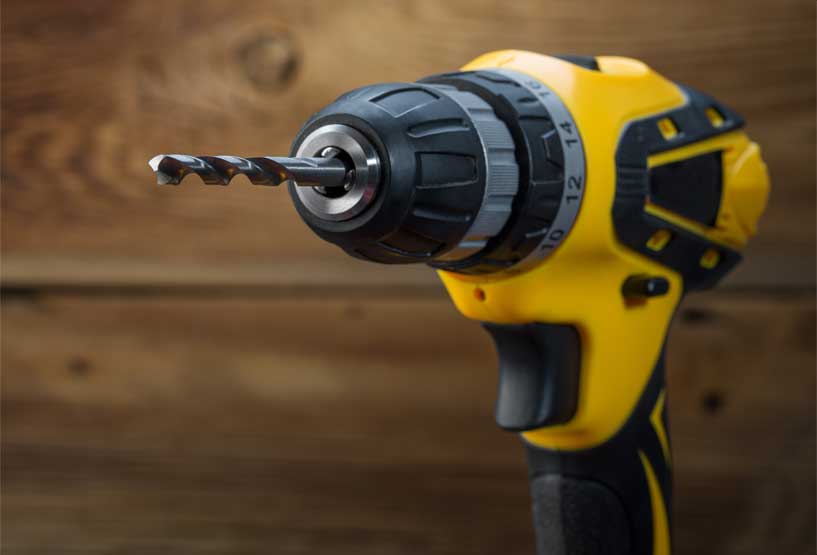Are you in the market for a new drill but unsure about which type to choose? With so many options available, it’s important to find the drill that best suits your needs. Whether you require power, versatility, or precision, this guide will help you make an informed decision.
1. Determine Your Drilling Needs
Before selecting a drill, consider how you will use it. Ask yourself the following questions:
- What kind of surfaces will you be drilling into?
- Do you need the drill to be positioned or held in a specific way?
- Will you be moving around frequently while using the drill?
- How long will you need to use the drill at a time?
By answering these questions, you can narrow down your search for the perfect drill.
2. Choose the Right Type of Drill
There are three popular types of drills to consider:
Drill Drivers
Drill drivers are the most common type of drill and are suitable for creating holes and driving or tightening screws into metal, interior walls, or wood. However, they may not be capable of drilling into stone, masonry, or concrete.
Hammer Drills
Hammer drills are designed for drilling into strong materials such as stone, concrete, or masonry. In addition to spinning, a hammer drill can move in and out in a hammer-like motion, providing extra force. It is not recommended to use a hammer drill for wood, as it can cause damage. Keep in mind that hammer drills are louder, so ear protection is necessary.
Impact Drivers
Impact drivers excel at driving screws, bolts, and nuts into metal and wood quickly. They have hexagonal sockets and are specifically designed for this purpose. Similar to hammer drills, impact drivers are also noisy, so ear protection is essential.
Consider the handle type as well. Most drills have T-handles to distribute loads effectively and enhance balance. However, for tougher jobs and larger screws, a pistol grip handle may be more suitable.
3. Cordless or Corded?
Cordless Drills
Cordless drills offer versatility and ease of use. They are generally lighter and more portable than corded drills. When selecting a cordless drill, consider the following:
- Power: Look for the voltage and torque specifications. Higher voltage usually means more power. Adjustable torque settings allow for greater control when working with different materials.
- Speed: Opt for a drill with variable speed settings, allowing you to control the rotations per minute (rpm). This feature is particularly useful for drilling holes or driving screws.
- Batteries: Lithium-ion batteries are popular due to their quick charging, longer lifespan, and lightweight nature. Pay attention to the battery charger and Amp hour (Ah) rating, as they affect charging time and battery life, respectively.
Corded Drills
Corded drills are ideal for heavy-duty use. In addition to torque and speed considerations, think about the following:
- Power: Corded drills are rated by wattage. Higher wattage generally indicates a more powerful drill.
- Special Direct System (SDS): SDS drills provide increased hammering force, making them suitable for tougher tasks. They can even be used with chisel bits, effectively turning them into mini-jackhammers for light demolition projects.
Remember, whether you choose a cordless drill driver or a corded hammer drill, the most important factor is finding a drill that meets your specific needs and gets the job done.
FAQs
Here are some frequently asked questions about choosing the right drill:
-
Can a drill driver be used for drilling concrete?
Drill drivers are not typically capable of drilling into concrete. For concrete drilling, a hammer drill or a dedicated rotary hammer is recommended. -
Which type of drill is best for woodworking?
Drill drivers are the most suitable option for woodworking tasks. They provide the necessary precision and power for drilling holes and driving screws into wood. -
Are all cordless drills compatible with impact-rated bits?
Yes, most cordless drills are compatible with impact-rated bits. However, it is essential to check the drill’s chuck compatibility to ensure a proper fit.
Conclusion
Choosing the right drill is crucial for any project. By considering your specific needs, the type of drill required, and whether a corded or cordless option is best, you can make an informed decision. Remember to prioritize power, versatility, and precision when selecting your drill. For more information and expert advice, visit Best Drill Press For Metal – your go-to source for all things drill-related.

As the CEO of BestDrillPressforMetal.com, I take immense pride in our unwavering commitment to transformation and excellence in metalworking. I am driven and passionate about creating the best possible user experience for our customers and helping them achieve their goals with precision and innovation. With my guidance, we have established ourselves as a leader and trusted partner within the industry by leveraging cutting-edge technologies to push boundaries with incredible products that exceed expectations. We understand that metalworking is more than just a process; it is an art form made real through passion, dedication, and diligence—all of which embody our core values at BestDrillPressforMetal.com.






